The Public Lab Blog
stories from the Public Lab community
About the blog | Research | Methods
Update from the Board of Directors
Dear Public Lab Community,
It is with a heavy heart that the Board of Directors announces Public Lab will cease formal operations at the end of April 2023. With a challenging economy and the impacts of the ongoing pandemic, we have made the difficult but necessary decision to end staff-supported programming and take most services offline. We’re grateful for your support and engagement with the Public Lab community.
Moving forward, Public Lab will continue to function in a limited, volunteer-run capacity. Changes to our programming include:
No full-time staff support. Public Lab is unable to engage on new projects, programs, or provide real-time support to inquiries. Virtual programming, such as Open Call, will no longer be available.
The Kits Store will formally close. Kits will no longer be available for purchase. Information on Public Lab DIY kits will remain on publiclab.org. Information on kit sourcing and materials can be found at publiclab.org/kits.
PublicLab.org will remain functional. We are working to move the Public Lab website to a free - and fully functional - server, so the community can continue to use the website, tools, and community-based functions. Mapknitter.org and SpectralWorkBench.org will remain offline for the time being. Should you be interested in re-coding the site to operate as a free, but static site, please engage with our coding community at GitHub.
We encourage continued engagement, posting, and sharing of information on PublicLab.org. Our goal is to maintain this open-source, participatory resource for community members to share their experiences with community science.
Thank you to everyone who has supported us. Public Lab is proud of all we have accomplished together, and its impact on the open technology and science movement. This breadth of community and programming has been built by many hands over the years, and we have the deepest gratitude to our departing staff and those who served before.
Public Lab remains rooted in the belief that the best ideas and solutions come from on-the-ground communities with deep knowledge of local issues in close, equitable, and sustainable partnerships with networks that bring capacity, science, and technology. Programming over the years successfully demonstrated that science and inquiry truly can shift power structures so that anyone can be a change agent.
We are proud to have supported place-based organizing, inquiry-based environmental education, and community science research. Over the last three years, we've hosted four place-based fellowship teams, led by community leaders around the United States working on climate and environmental health issues in their own backyard. These projects supported residents to easily and reliably track issues so they can make better-informed decisions, determine action in urgent situations, and inform policies that affect their every day. These efforts were aided by our research program that provided up-to-date information on science and legal advancements in environmental topics, and hands-on training in coordination with Public Lab kits.
Connected to these place-based efforts, we supported classroom educators to further student-led, inquiry-based learning through community science. We successfully supported numerous schools in the Greater New Orleans area, the Chattahoochee and Chesapeake Watersheds, and in western Washington to implement Community Science in the Classroom curriculum and the related Messages from the Mississippi program. This student-led approach emphasizes local and traditional knowledge, community ownership of research, and working together in scalable networks to encourage collaborative learning and civic engagement. We’re heartened that these programs and curricula will continue in classrooms across the country.
We recognize that our closure will be a disappointment to many in the community. Please know that this decision was not made lightly, and we have explored all options before arriving at this conclusion. As operations wind down, we will do everything possible to minimize this impact. We are working to ensure that resources and materials remain available to anyone who needs them, and will do our best to provide support and guidance during this transition period.
Once again, thank you for being part of this journey. We are so proud of the years of accomplishments and shared exploration, and grateful for the support and enthusiasm of this community. It has been an honor to work with you all.
Sincerely,
The Public Lab Board of Directors
hello@publiclab.org
Follow related tags:
education barnraising organizing air

Important Update from Public Lab
Dear Friends and Supporters:
With a challenging economy and the impacts of the ongoing pandemic affecting everyday life, we’re grateful for your continued support and engagement with Public Lab.
Unfortunately, these are difficult times for all of us. Due to funding challenges, we have made the tough but necessary decision to scale back programming and take certain services offline. We are doing our best to sustain core programming and support for our community. And Public Lab needs your help.
Given the current situation, we’ve made important changes to our programs. These include:
- Reduced capacity for our team. We will engage less on new projects, and focus on sustaining our place-based fellowship, community science outreach, and environmental education programs.
- Virtual programming will change, including the hosting of Public Lab’s Open Call. The Tuesday Open Call will still occur on a weekly basis, hosted by program team leads each week. Changes to this schedule will be announced on publiclab.org.
- Reduced capacity at our Kits Store. Kits fulfillment and shipping will be a minimum of two to three weeks from order date, and certain kits will be pre-order only. Specific changes will be outlined in the store.
- Mapknitter.org and SpectralWorkbench.org will go offline August 15th. While we anticipate a functional return of these sites, we do not have an estimated date at this time.
- The November 2022 Barnraising will be rescheduled to Spring of 2023.
We are dedicated to serving this community, and hope to resume programming to its regular capacity over the next several months. If you’re able, please consider making a gift today to help sustain the Public Lab team, and ongoing community support and educational outreach.
Over the last 2+ years, we’ve been reminded of how interconnected we all are. Thank you for being part of our community. Without you, none of this is possible.
Be Safe and Well,
Jordan Macha
Executive Director, Public Lab
Follow related tags:
education events kits spectralworkbench
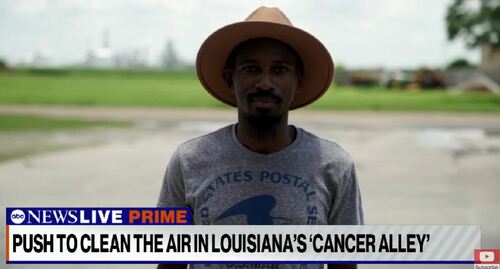
Community Air Monitoring Highlighted in Media Clip; False Solutions Promised for Our State
Travis London, the Game-Over-Formosa project fellow, was featured in last month's NBC News story covering Louisiana's ongoing environmental crisis --and one hotly-debated solution.
"You can see a lot of impact," Travis told the reporter, as he described the Purple Air monitors that the Public Lab team has set up outside of homes in St. James parish. These small-scale, inexpensive monitors capture ambient levels of industrial pollutants, where state and federal agencies have failed to monitor.
Travis was featured alongside Sharon Lavigne, an internationally recognized environmental activist, who has spearheaded the environmental movement in Louisiana's River Parishes through her organization RISE St. James. For years, Sharon and her community have fought petrochemical expansion in their community. And, some small battles have been won. The proposed Formosa Plastics facility has been halted until a full Environmental Impact Statement has been conducted, a decision by the Army Corps of Engineers that signaled the Biden Administration's willingness to take action and spurred Public Lab's Game-Over-Formosa project. But with new petrochemical facilities continually slated for development and state leaders who refute industrial culpability in the region's health crisis, the fight is far from over.
To complicate the matter further, Governor Edwards has proposed a solution to curb carbon emissions that environmental activists claim may make matters worse: blue hydrogen. Low carbon, or "blue," hydrogen is produced by using carbon capture technology to sequester greenhouse gasses emitted in the production process and store them deep underground. The result is liquid fuel that leaves behind only water.
An opportunity to reduce the greenhouse gas emissions while increasing industrial investment? For a quickly-eroding coastal state, it sounds too good to be true.
And, in October of last year, Edwards unveiled plans for a $4.5 billion blue hydrogen plan to be constructed in Ascension Parish, near St. James. As the first carbon capture project in the state and one of the largest in the world, the facility will "help the state of Louisiana play a key role in the energy transition," Air Products and Chemicals spokesperson tells NBC news.
Yet, environmental activists argue that blue hydrogen technology is not the solution many have claimed it to be. Rather, carbon capture and sequestration is mere green-washing, many claim, designed to keep the fossil fuel industry entrenched in Louisiana's economy for decades to come, as renewable energy sources gain popularity.
This is because the process to make blue hydrogen is extremely energy-intensive. A recent study found that, throughout its lifecycle, blue hydrogen may emit more greenhouse gases than traditional natural gas. This is because it retains only 70-75% of the potential heat stored in the natural gas from which it was derived. Another study found burning blue hydrogen to be 20% worse for the climate, since it emits methane, a greenhouse gas far more potent that CO2.
What's more, the fossil fuel industry threatens Louisianans' way of life, not only by contributing to climate change, but by the immediate environmental degradation.Webs of pipelines have damaged the coastline are prone to leaks. To make blue hydrogen, both extracted natural gas and methane waste must pass through "reformers, pipelines and ships, providing added opportunities for leaks." Carbon capture, New Orleans one resident tells NBC news, is just an excuse "to ignore the fact that we have to stop using fossil fuels."
In Louisiana, citizen-scientists and professional scientists alike capture excessively high levels of air pollutants every day. Yet, state leaders draw public attention away from the localized environmental issues at hand with flashy new technology that many doubt to be an effective remedy for climate change, nor a safe, long-term solution for our state.
As emissions reductions targets draw ever near, both policy and technological solutions will continue to emerge. Yet, a just transition to clean energy means advancing climate solutions that work for everyone, without introducing or maintaining sources of environmental degradation. For state and local leaders, this means centering the voices of BIPOC and other historically marginalized groups in the decision-making processes. It's time to follow the lead of the locals, asking community members what they would like to see for the future of their home.
Follow related tags:
blog zoom:6 with:travislondon formosaplastics

Water monitoring 101 with Vernon Haltom
Follow related tags:
drones west-virginia mining water-quality
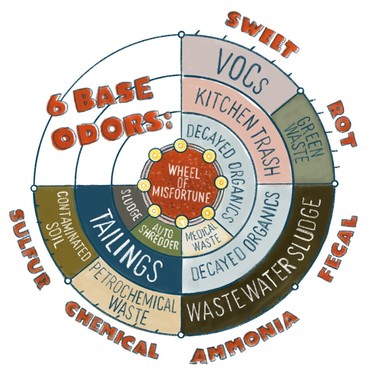
Logging Complex Odors
During the summer, our fellowship team logged ambient odors on field sheets to accompany data from our gas monitors. As we are closing up the fellowship and looking through the data, we want to know what quality of odors are coming into our community from a nearby landfill - and if there are patterns or trends in the type, frequency or accompanying factors.
In the past, we defined odors like decomposing waste, as "green waste" or "trash," which are subjective descriptors. I was inspired to reduce the odors to their basic components, remembering a toy my daughter loved when she was younger. It was a perfume science lab, wherein you could make fragrances using approximately 6 different base odors (vanilla, lemon, sandalwood, etc).

I identified the base odors that emanate from a nearby landfill:
- Sweet
- Rot
- Fecal
- Ammonia
- Chemical
- Sulfur
Odors that we used to describe as "kitchen trash" became, "sweet" and "rot" because those are the primary components of that particular odor. Instead of "wastewater sludge," we described the smell as "fecal" and "ammonia."
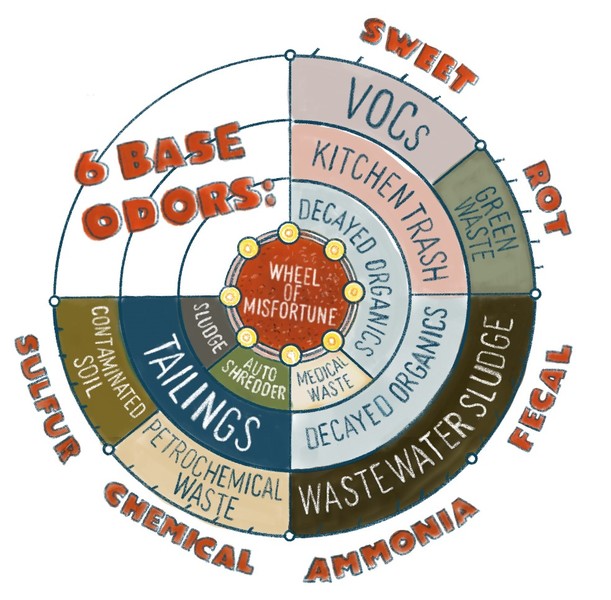
With this method, we can enter data into categories on a spreadsheet that we can analyze at a later time:
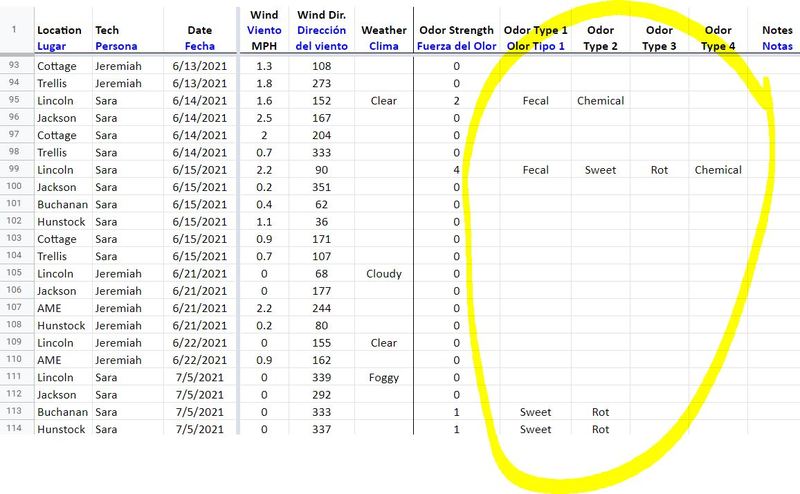
Follow related tags:
landfill air-quality blog barnstar:empiricism

Announcing New Fellowship Team: Game Over Formosa!
Lead Image: Map of industrial facilities in St. James Parish. Found on The Advocate, courtesy of Justin Kray of the Louisiana Bucket Brigade
The Project Issue: Proposed Formosa Plastics Plant in St. James, Louisiana
The St. James parish alongside the Mississippi river in southern Louisiana is a historically black and now elder community with 15.6% of residents living below the poverty line. Many of the residents trace their lineage back to the enslaved families who worked the plantations along the banks of the Mississippi. The land is filled with historic and sacred sights including the unmarked graves of slaves. For years, St. James Parish has been extremely overburdened by industrial pollution. The 258 square miles of St. James hosts no less than 11 industrial facilities that are large enough to be required to report their pollution to the federal EPA each year. These include refineries, a fertilizer plant, a steel company, an asphalt company, and several chemical companies. The list of chemicals emitted into the air, water and soil in St. James and surrounding areas include cancer causing dioxins, asbestos, chlorine, lead, mercury, acids, benzene, toluene, methanol, ethylene, and hydrogen sulfide to name a few (the EPA’s TRI database report for St. James Parish, 2020).
For years, the community, already struggling with extreme pollution, has been fighting to keep out new industry, particularly one plant called Formosa Plastics slated to be a 2,500 acre project just one mile from an elementary school (Center for Biological Diversity). As a company, Formosa has been a historic bad actor (see follow up post on Formosa Around the World). Their Texas plant released “thousands of plastic pellets and other pollutants into Lavaca Bay and other nearby waterways.” These spills were brought to court in a private citizens suit by Dianne Wilson and nonprofit Texas Rio Grande Legal Aid resulting in a $50 million settlement, “the largest in U.S. history involving a private citizen's lawsuit against an industrial polluter under federal clean air and water laws” (Texas Tribune December 3, 2019). Formosa plants around the world have also experienced several explosions causing community evacuations, major chemical releases, and even worker deaths (see follow up post).
On August 18, 2021 the US Army Corps of Engineers announced it would “require a full “environmental impact statement” for the massive petrochemical complex Formosa Plastics proposes to build in St. James Parish, Louisiana. The decision is a major victory for opponents of the plant, who sued to block the project in January 2020 and convinced the Army Corps to suspend its permit” in fall of 2019 (Center for Biological Diversity). An impact statement can take anywhere from 51 days to 3 years to do. For this statement, they’ll be “required to assess the impact of a proposed project on the physical, cultural, and human environments affected by the proposed project… [including] provid[ing] a baseline for understanding the current environmental situation in relation to the Proposed Action.” The EIS should also include air, water, historical and economic impacts of the project (AmericanBar.org). The EIS should also trigger a new comment period for community members.
The aim for this project is to regularly collect particulate matter and other air quality monitoring data to grow the body of evidence on the existing levels of pollution to show the pollution burden already borne by the St. James Parish community. We aim for this information to be used to educate the community, and provide scientific evidence for why further pollution sources such as the Formosa Plastics, should not be developed in this community.
Project Goals:
The goals of this project are to:
A: Regularly collect particulate matter air quality monitoring data to grow the body of evidence on the existing levels of pollution to show the burden already borne by the Donaldsonville and St. James Parish communities. We aim for this information to be used to educate the community, and provide scientific evidence for why further pollution sources such as the Formosa Plastics, should not be developed in this community.
B: Regularly share project updates including monitoring methods, tools, challenges, data and questions on Public Lab and in other project identified spaces as appropriate.
C: Work towards advocacy around the air pollution issue in Donaldsonville and St. James Parish by working to understand local permits, zoning, and legal landscape in aim of gathering information for the upcoming Environmental Impact Statement and community input for the open comment period.
D: Work towards project pass off and longevity by focusing on communications materials around the monitoring results, advocacy information, and how people can get involved and monitor. We will use this to put together information sessions, as well as pamphlets and print materials.
Community Organizing Fellow and Project Lead: Travis London
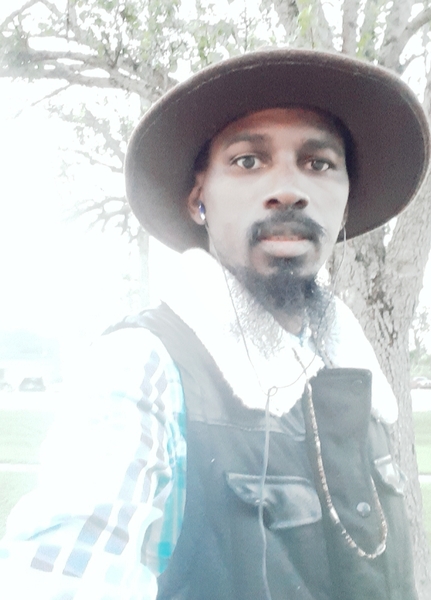
Travis London is the cousin to the late Louisiana activist, Alberta Hasten-president of Louisiana Environmental Justice Community Organization Coalition. He has worked alongside Sharon Lavigne, Rise For St James, and a legal team to delay Formosa’s construction in St. James. He has also had victories in organizing in Louisiana for Medicaid expansion, higher salaries for teachers, and halting a compressor station from being too close to a neighborhood. In 2020, Travis appeared on a Netflix series alongside Diane Wilson on the show Dirty Money: Port Comfort episode, where Diane won the largest settlement from an individual lawsuit in environmental history. Alongside his local work, Travis works to help 5 Northeastern states near the Ohio River fight against the Mountaineer NGL project, and has organized for various causes in El Salvador, India, Africa, and other places around the world. Travis London is the 2018 Ascension Parish ICON Award winner and the Louisiana Economic Development’s Business and Fashion Expo Prize Winner.
Fellows working on this project:
- Travis London: Community Fellow and Project Advisor
- Caitlion O'Neill: Environmental Policy Fellow
- Tyler Ellis: Technical Air Quality Fellow
- Allison Woolverton: Documentation Fellow
Follow related tags:
air-quality blog pollution pm